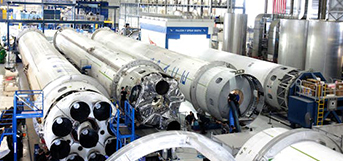Most companies can’t afford the luxury of owning a dedicated in-house team of DevOps engineers. Therefore, they are on the lookout for a sincere DevOps partner who can handle their responsibilities well. The ‘DevOps’ buzzword encompasses a wide spectrum of skill sets, including testing, business analytics, quality, and out-and-out business side. So when you are looking for that exclusive task force, you need to consider that it’s an ultimate blend of seasoned technical competence and practical knowledge of deployment operations.
This team helps to create business value through customer satisfaction and maintain a healthy production environment. DevOps teams adhere to Agile principles and foster collaboration between IT and operations personnel for efficient delivery. They facilitate automation by creating a Continuous Delivery pipeline for quick, smooth and lean workflows.
Here are a few attributes, you must keep in mind while shortlisting a DevOps compatible partner for your organization.
1. Technical skills and certifications – A few questions that may cross your mind as you trigger off your relationship with a new outsourcing partner include –
- Do they have suitable skillset and relevant expertise?
- Is DevOps the company’s core competency or a niche one for a selected few?
- How does the company hire new talent with DevOps skills?
- Do the team members hold certifications like PMP, AWS Certified SysOps Administrator, Scrum master, or AWS Certified DevOps Engineer.
It’s good to work with a robust DevOps team having a multi-disciplinary skill set adhering to the principles of automated testing, continuous delivery, integration, and deployment. Those companies partnering with Microsoft Azure and AWS cloud platforms will help to empower your journey towards digital transformation.
2. Tools and software – As DevOps process involves infrastructure deployment, configuration, and management via code. You need to know what all infrastructure-oriented tools the prospective partner company has expertise in like Docker, Ansible, Puppet. Also on what all programming languages do the DevOp teamwork on, is it Ruby, Python, PHP, or Java.
You must evaluate what all continuous integration tools are used by the potential DevOps partner for automating software build, integration, and testing procedures. Some commonly used tools are Bamboo, Jenkins, TeamCity, Travis CI.
3. Emphasize on DevOps culture – According to Nathen Harvey, VP community development at Chef, “DevOps will look different inside every organization and the traits and skills needed to thrive on a DevOps team will differ.” A few key behavioral traits can be used to identify IT partners with an aptitude for DevOps. You can stick to a basic quality checklist, which includes –
- Metrics collection
- Develop features iteratively
- Risk management
- Select tools that fit your job
- Continuous integration and delivery
- Focus on availability
- Write tests
- Capacity planning
- Team empowerment
- Reach a consensus on critical decisions
- Implement a scalable system design
4. Rely on metrics-based decision making – Feedback and metrics collection plays a pivotal role in DevOps methodology. Data-driven decision making is crucial as theoretical arguments can be best resolved through execution rather than emotional arguments. In such teams decisions regarding how to tackle and scale the project are based on performance metrics. You will feel comfortable aligning with a partner who believes in arguments based on numbers and can tweak figures to reach desirable outcomes.
5. Pay attention to communication skills – It’s essential to have an outsourcing partner with effective communication skills for the lack of it may derail project sprints and your organization’s overall success. Prompt and timely interactions during due diligence can help you judge how organized and reliable they will be for long-term engagement.
6. Choose a team with the right attitude – As DevOps is more of a cultural mindset of collaboration and cohesion, so it will be best if we hire a partner with the right attitude. To be precise, hire a team that wants to work together with full cooperation rather than a team that plays the blame game. You must focus on teams who work hard to achieve a common goal of an organization’s success. The partner you hire must have the attitude of autonomy, diversity, productivity, and equality. By diversity, we understand the diversity of style, skills, and thinking. By autonomy, we comprehend that the team is accountable to find the best possible approach for completing a particular task.
7. Focus on meritocracy – Look for a partner who recognizes the achievements of all employees, facilitates information sharing, and thrives on transparency. Meritocracy fosters the spirit of team building and peer recognition, thus breaking down any formal hierarchy within an organization. An organization where designation or authority holds less importance than an employee’s technical prowess, craftsmanship, and credibility is likely to be an ideal DevOps partner. A company that adopts DevOps culture thrives well even in the face of disruptions.
Conclusion:
The most important thing to consider while looking out for a DevOps partner is the final outcome, be it in terms of accelerating the time-to-market, enhancing the quality of solutions, or improving recovery time. Ample knowledge of Agile project lifecycles will help in eliminating delivery obstacles.
To conclude, I would like to quote a few famous lines by Andrew Carnegie, “Teamwork is the ability to work together toward a common vision. The ability to direct individual accomplishments toward organizational objectives. It is the fuel that allows common people to attain uncommon results.”
If you have any questions regarding DevOps or if you are looking to hire a DevOps partner, feel free to contact us at info@people10.com
Author
Kamal Chauhan excels in DevOps and automation, focusing on infrastructure and application deployment solutions. He designs and implements automated deployment pipelines for diverse applications and sectors.



